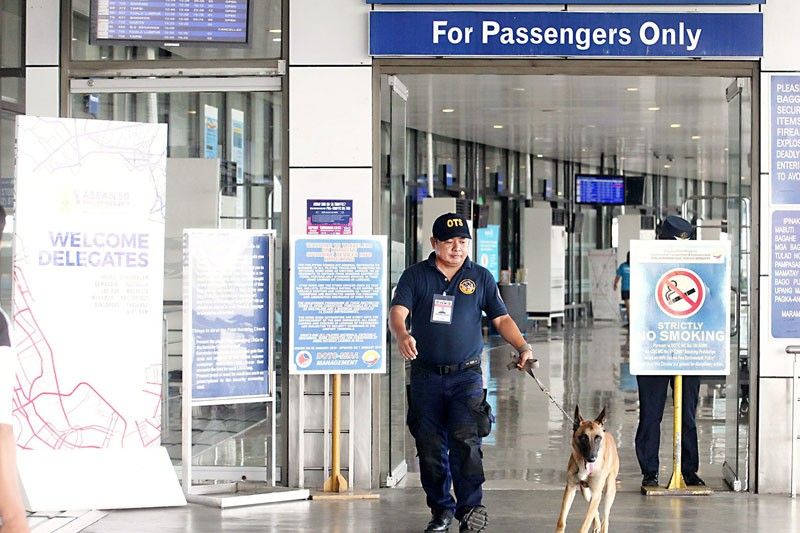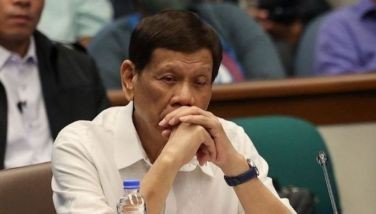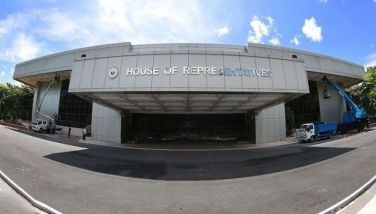US issues travel advisory: NAIA security deficient

MANILA, Philippines — The US Department of Homeland Security (DHS) has issued an advisory directing airlines going to the Philippines to alert their passengers on the deficiency of security measures at the Ninoy Aquino International Airport (NAIA) in Manila.
The DHS on Wednesday said Manila, which serves as a last-point-of-departure airport for flights to the US, “does not maintain and carry out effective security consistent with the security standards established by the International Civil Aviation Organization (ICAO).”
“In view of this finding and effective immediately, airlines issuing tickets for travel between the United States and MNL are directed to notify passengers in writing of this determination,” the DHS advisory said.
The DHS said the advisory was based on assessments by a team of security experts from the US Transportation Security Administration (TSA).
Aside from ordering airlines to issue written alerts to its passengers, the DHS said the security advisory should be “prominently displayed” at all US airports that provide regularly scheduled flights to Manila.
It said the security warning should be published in the US Federal Register, which documents all US government rules and regulations.
“In coordination with the Department of State and the Department of Transportation, TSA representatives have been working with the Philippine government to assist airport and transportation authorities in bringing MNL up to international security standards. TSA will continue to work with the Philippines and assist its aviation authorities with correcting the security deficiencies at the airport,” Homeland Security said.
The TSA will continue to assess security measures at the airport and take appropriate actions as warranted, it said.
Improvements
“We are collaborating closely with the Philippines Department of Transportation (DOTr) and related agencies, and have every confidence in their leadership and their commitment to improve aviation security,” US Ambassador Sung Kim said.
Kim said the Philippine government made efforts to improve security measures. “We fully expect that they will soon meet ICAO security standards,” he added.
Kim mentioned the support of the US State Department that has approved $5 million for airport security improvements at NAIA to include critical training and technology improvements.
He said the TSA has provided Aviation Security Advisors to the Philippine government to assist with development and implementation of corrective measures at NAIA.
He added the TSA conducted an analysis of NAIA security operations and provided recommendations on technology use and maintenance, streamlining screening operations, and modernization of NAIA security infrastructure.
Foreign Affairs Secretary Teodoro Locsin Jr. said the advisory issued by the DHS should not be questioned.
“Never question US Homeland Security. Never. Ever. It stands between us and chaos,” Locsin said in his Twitter account.
The DOTr assured the public that authorities are giving utmost priority to the implementation of security measures at the NAIA.
The DOTr said the TSA conducted an assessment this year and gave recommendations regarding airport security enhancement and improvements.
The recommendations of the TSA include installation of new equipment such as X-ray machines, walk-through metal detectors and alarm systems.
Another recommendation the TSA has made is the conduct of new background check procedures for newly hired airport personnel, which will include neighborhood and National Intelligence Coordinating Agency checks for those implementing security control, and the submission of new National Bureau of Investigation clearances for all access pass holders.
The TSA, according to the DOTr, also recommended a change in the “security culture” among long-time NAIA personnel in the area of consistent implementation and observance of strict security procedures.
“In this regard, re-trainings have been, and continue to be, conducted to instill in every personnel the need to be consistent in every aspect of security,” the DOTr said.
The DOTr said Manila International Airport Authority and Office for Transportation Security have been continuously working and coordinating with other international assessment bodies that include the ICAO with additional recommendations and suggestions regarding the implementation of the corrective action plan crafted by the MIAA and OTS.
“There is no cause for alarm even as we put in place security enhancements following the recommendations of the US TSA. There is nothing among these recommendations that cannot be addressed. Rest assured, these improvements are not intended to put burden on the passengers, instead, these are being done to ensure a secured flight for everyone,” the MIAA said in a statement.
“Standards are there so the global aviation community will have a common reference point, and it is highly important that our aviation security protocols at NAIA meet if not exceed them,” it added.
Why single out NAIA?
MIAA general manager Ed Monreal said a total of 16 recommendations were given by the TSA. He said out of the 16, seven have been completed and cited for notable improvements.
“The other nine are more on consistency and sustainability. They (TSA) observed laxity in some passengers passing through the security checkpoint. Sometimes strict, sometimes lax,” Monreal said.
Monreal admitted they have no idea why NAIA was singled out in the DHS advisory.
“Both MIAA and DOTr have no idea if it is only the Philippines that has been given such kind of travel advisory or there are other countries as well,” he said.
Monreal said this was the first time NAIA was given this type of advisory.
Monreal pointed out the TSA has been doing the assessment of the airport yearly.
Aside from the US, auditors from UK, Australia, Canada and New Zealand are also making regular security assessment at the airport but it was only the US that issued the advisory.
The DHS advisory came at a time when NAIA operations are at their peak during the holidays.
The Department of Tourism (DOT), for its part, assured travelers that the Philippines is a safe place to visit this holiday.
Tourism Secretary Bernadette Romulo-Puyat said MIAA and DOTr are committed to positively address the security concern of the DHS.
She added that the DOT is in close coordination with the Philippine National Police and the Civil Aviation Authority of the Philippines, which are tasked to oversee the country’s aviation security.
Puyat stressed all the government agencies concerned had repeatedly assured the DOT of their readiness to assess and respond to threats to ensure the safety and security of tourists and travelers.
“We are confident in their capabilities to handle this issue and we are ready to help them in any way to expedite the resolution … With this, we assure the international community, that the Philippines remains a safe haven for our visitors and residents alike,” Puyat said. – With Rudy Santos, Robertzon Ramirez
- Latest
- Trending




























